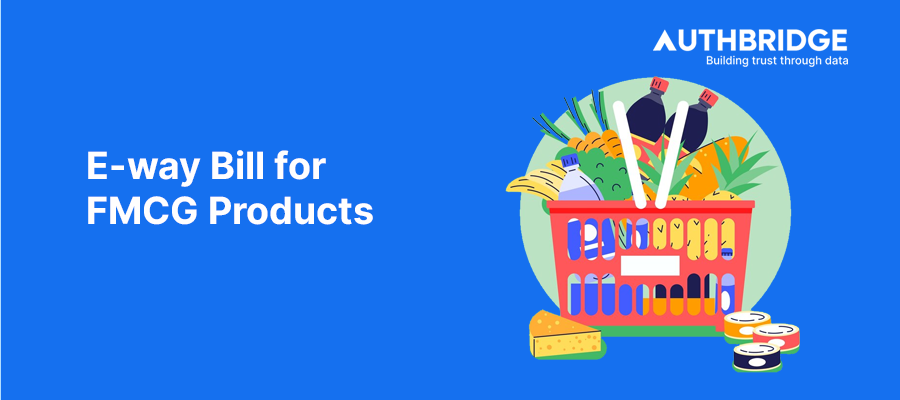Navigating E-way Bill Compliance And Efficiency In The FMCG Sector: A Comprehensive Guide

The Fast-Moving Consumer Goods (FMCG) sector, a cornerstone of the Indian economy, encompasses a wide range of frequently consumed products such as dairy, personal care, and household cleaning items. The introduction of the E-way Bill under the Goods and Services Tax (GST) regime has marked a significant shift in how the transportation of goods is managed within this sector.
Overview of the FMCG Sector in India
The FMCG sector, valued at approximately INR 500 billion, is the fourth largest sector in the Indian economy. It is characterized by a high volume of products, quick shelf turnover, and a complex distribution network. The sector's success hinges on efficient supply chain management to ensure timely delivery of goods.
The Necessity of E-way Bill for FMCG Products
The E-way Bill system, implemented in 2018, mandates the generation of an electronic bill for the movement of goods exceeding a value of Rs. 50,000. This system aims to curb tax evasion and ensure a seamless flow of goods across state borders, which is crucial for the FMCG sector due to its dependency on quick and efficient transportation.
Impact of E-way Bill on FMCG Sector
The E-way Bill has brought about significant changes in the FMCG sector, impacting various aspects of supply chain management.
Streamlining the Supply Chain
The elimination of check-posts and the introduction of a unified documentation process have streamlined interstate movement, reducing transit times and logistical bottlenecks.
Enhancing Transparency and Efficiency
The digital tracking of goods movement has enhanced transparency, allowing companies to better manage their inventory and logistics, leading to improved operational efficiency.
Reduction in Transportation Time and Costs
With faster check-post clearances and reduced paperwork, the transportation time and associated costs have significantly decreased, benefiting the FMCG sector's bottom line.
Types of FMCG Goods and E-way Bill Applicability
Categories of FMCG Goods
FMCG goods include a broad spectrum of products, from perishables like dairy and bakery items to non-perishables such as personal care and household cleaning products. The perishable nature of many FMCG products underscores the importance of the E-way Bill in ensuring quick transportation.
Threshold for E-way Bill Generation in FMCG
The threshold for E-way Bill generation is a consignment value of Rs. 50,000. However, many FMCG products, such as milk, eggs, and flour, are exempt from GST, often negating the need for an E-way Bill unless the cumulative value of taxable items in the consignment exceeds the threshold.
E-way Bill Provisions Specific to FMCG Sector
Exemptions and Special Considerations
For intra-state transportation within 50 km, no E-way Bill is required, benefiting local FMCG distribution. Additionally, the bulk generation of E-way Bills and sub-user functionality cater to the sector's need for efficiency in handling multiple shipments.
Bulk Generation and Sub-User Facility
FMCG companies can generate E-way Bills in bulk, improving organizational efficiency. The sub-user feature allows for a controlled network within large organizations, facilitating role assignment across multiple locations.
API Interface for Seamless Integration
The E-way Bill system's API interface enables direct integration with a company's ERP software, automating the E-way Bill generation process and reducing manual errors.
Challenges and Solutions for FMCG Companies
Common Challenges in Implementing E-way Bill
FMCG companies often face challenges such as adapting to new technology, managing bulk shipments, and ensuring compliance across the supply chain.
Best Practices for Compliance and Efficiency
Adopting integrated software solutions, staying updated with regulatory changes, and training staff on E-way Bill procedures are crucial for smooth compliance and operational efficiency.
Recent amendments have further streamlined the E-way Bill process, including provisions for considering only the value of taxable supply in mixed consignments and extending the validity of E-way Bills to midnight of the day following their generation.
Conclusion and Future Outlook
The E-way Bill has significantly impacted the FMCG sector, bringing about efficiency and transparency in the supply chain. As the system evolves, further enhancements are expected to address the sector's unique challenges, paving the way for even greater efficiency and growth in the FMCG sector.
Category

Abhinandan Banerjee
(Associate Manager - Marketing)
Abhinandan is a dynamic Product and Content Marketer, boasting over seven years of experience in crafting impactful marketing strategies across diverse environments. Known for his strategic insights, he propels digital growth and boosts brand visibility by transforming complex ideas into compelling content that inspires action.



